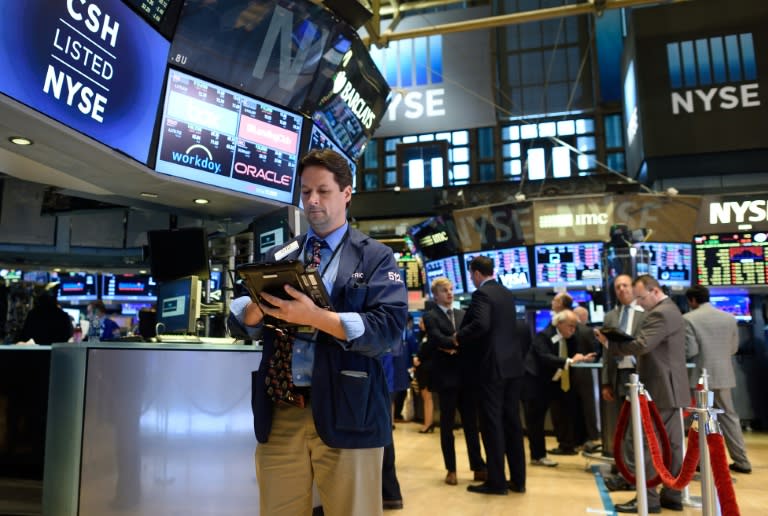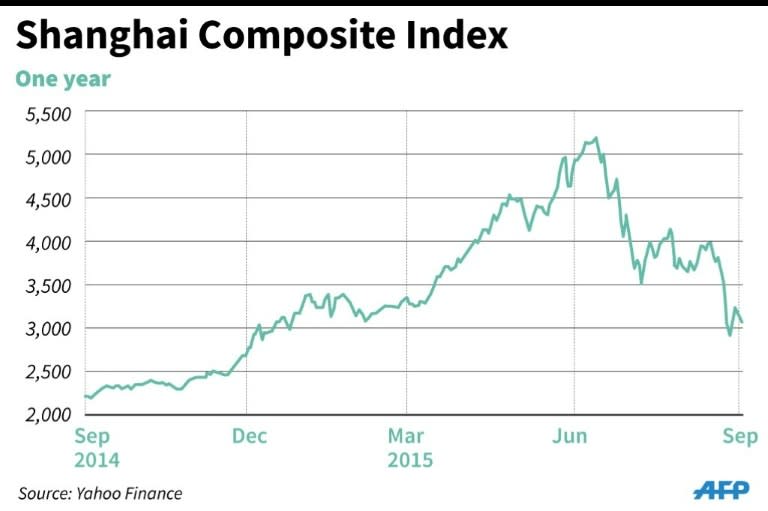Wall St rebounds amid more wild swings in global markets
Investors on Wall Street found renewed confidence Wednesday but world markets remained frayed and volatile amid rising worries of a China-driven stall in global growth. Most major markets found their way to positive territory, even as warnings mounted of more fallout from China's problems. The main exchanges were still far from recovering the steep losses of Tuesday, and analysts warned of more turbulence ahead. "We're still in a pattern of a day down and a day up, or two days down and two days up," said Mace Blicksilver of Marblehead Asset Management "It looks like there is still real nervousness out there, and only time will tell whether it's justified." After the day started out in the red in Asia -- Shanghai fell another 0.20 percent, Tokyo 0.39 percent and Hong Kong 1.18 percent -- Europe's main bourses turned around. London closed 0.41 percent higher, while Paris ended 0.30 percent up and Frankfurt finished 0.32 percent ahead. In New York, buyers moved on blue chips and tech stocks that were heavily sold on Tuesday, with giant Apple leading the way with a 4.29 percent gain. The buying accelerated in the last half-hour, boosting the Dow to a 1.82 percent gain when the closing bell rang, the S&P 500 1.93 percent, and the tech-centric Nasdaq Composite, 2.46 percent. - Beijing supporting market - Analysts said Beijing was behind the small loss on the Shanghai exchange, which had opened more than 4 percent lower on Wednesday morning. Wu Kan, a Shanghai-based fund manager at JK Life Insurance Co., said authorities appeared to have been buying blue-chip stocks in recent days in an effort to support the market. "But investors have lost confidence amid the ongoing de-leveraging and the overnight global rout," he said. "The correction isn't over yet." The state-owned China Securities Journal reported Wednesday securities firms were transferring more money to a government-supported fund to help stabilise the market. Shane Oliver, a global strategist at AMP Capital Investors Ltd. in Sydney, told Bloomberg News that the worries in markets have yet to fully subside, especially as the US Federal Reserve mulls raising its benchmark rate. "You have worries about the global growth outlook, led by Chinese concerns at a time when the Fed is thinking about raising interest rates, and that's leaving investors very twitchy." "I think we've seen the worst, but it's an environment where volatility is likely to continue." US markets were helped by the Fed's periodic Beige Book survey, which depicted the economy still growing at a modest to moderate pace across most of the central bank's 12 districts. Survey respondents were optimistic about the coming months. "Respondents in most sectors across districts expected growth to continue at its recent pace," it said. At the same time, it gave no evidence of inflationary pressures, nor of any strong tightening of the job market, that could force the Fed to start raising interest rates at its next meeting in two weeks. - Calls for G-20 action - Eyes were turning to the summit of G-20 economic chiefs in Ankara, Turkey on Friday and Saturday. US Treasury Secretary Jacob Lew is to stress to counterparts the need to boost global demand via monetary and fiscal policy to fight off China's slump, and the International Monetary Fund is expected to press the same line. The toll in China's downturn is increasingly showing up in advanced economies. The Australian dollar -- heavily linked to demand for the country's abundant natural resources -- plumbed six-year lows Wednesday as figures showed the economy logged a slower-than-expected 0.2 percent quarterly expansion. On Tuesday Canada -- also heavily dependent on oil exports -- said the economy contracted in the first half, its second plunge into recession in seven years. Meanwhile the dollar rose to $1.1225 against the euro from $1.1313 late on Tuesday.

 Yahoo Finance
Yahoo Finance 



